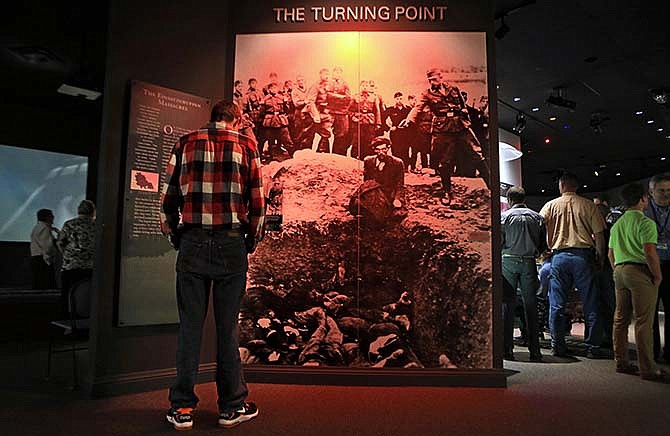ST. LOUIS (AP) - Survivors of the Holocaust are dwindling, so the Holocaust Museum and Learning Center in suburban St. Louis is in the process of adapting to how it will proceed once all of the survivors - whose personal stories and visits are an important part of the experience at the museum - are no longer with us.
Mendel Rosenberg, 87, is among those who share their story of Holocaust survival at the museum in west St. Louis County. He shares personal anecdotes about his time in concentration camps, where prisoners often weren't provided with food, and tells visitors how he weighed only 60 pounds when he was 16.
"They didn't care what happened to us," Rosenberg said of the Nazis.
He personally lost 15 family members in concentration camps, including his father. In total, 6 million Jewish people died during World War II.
"It's important for people to understand people survived, had lives, coped in different ways. The continuation of life takes on additional experiences," said Vera Emmons, whose mother survived six different camps, including Auschwitz-Birkenau.
As the museum celebrates its 20th anniversary this year, it's looking at ways to continue sharing the firsthand accounts of Holocaust survivors who have since died. Of the 300 survivors initially estimated to have settled in the area after World War II, fewer than 100 remain, with many of them dying over the past 70 years.
"We're starting to think how we are going to cope; we're kind of grappling with it," said Jean Cavender, director of the museum. "It's going to be a challenge thinking what that will be like."
The museum installed in 2012 an exhibition highlighting other genocides worldwide, including conflicts in Bosnia, Rwanda and Nigeria, to show how "the lessons of the Holocaust are not yet learned," Cavender said.
Ongoing conflicts also make it easier to talk about the Holocaust in the present, Emmons told the St. Louis Post-Dispatch (http://bit.ly/1ONNCNy).
"I talk about how my grandparents, living in Berlin, thought they could wait it out, but it became apparent they couldn't," Emmons said. "But for you to have a way out you have to have a place to take you in. We're seeing that with Syria today."
The museum expects to tally 500,000 visitors by the end of the year. As it plans for the next 20 years, the museum will focus on keeping visitors engaged and thinking about the Holocaust as more than a tragedy that happened decades ago.
"We're never going to leave out the foundation of what this is about, learning from the history and lessons of the Holocaust," Cavender said.

